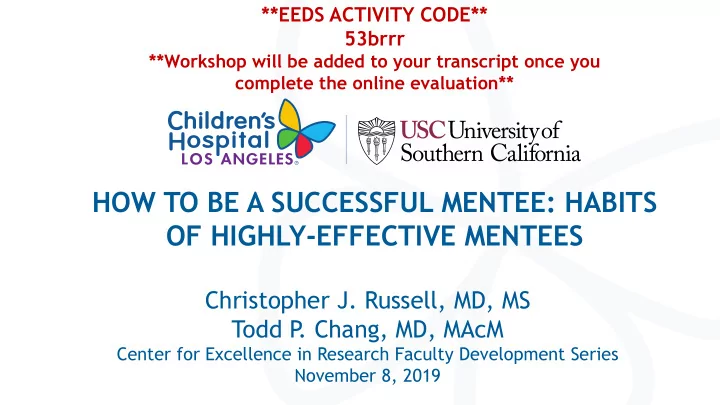

**EEDS ACTIVITY CODE** 53brrr **Workshop will be added to your transcript once you complete the online evaluation** HOW TO BE A SUCCESSFUL MENTEE: HABITS OF HIGHLY-EFFECTIVE MENTEES Christopher J. Russell, MD, MS Todd P . Chang, MD, MAcM Center for Excellence in Research Faculty Development Series November 8, 2019
Outline • Introductory Remarks (15 minutes) • Large Group Case Discussion (30 minutes) • Mentor/Mentee Panel (30 minutes) • Large Group Reflection and Summary (10-15 minutes) 1
Who am I? • Pediatric hospitalist (2010-current) • Mentee: Mentored Career Development Grant (KL2; 2014-2016) • Primary mentor for several fellows and junior faculty 2
Who am I? • Pediatric emergency medicine physician (2010-current) • Mentee: American Heart Association, Stemmler Fund, • Primary mentor for fellows, junior faculty, HRSA PECARN HEDA Principal Investigator 3
Be Prepared • Clarify what you need (pre-work) – Coach vs sponsor vs connector – Professional vs personal – Research vs clinical vs leadership • Have a written agenda for every meeting 4
Sample agenda • Dashboard review ( 10 mins , see attached) • K23 regrouping ( 40 mins ): – Follow-up from PHM discussion (5 mins) – Review new specific aims page (20 mins) – Discussion re: postponing to get additional preliminary data, allow for better external review (15 mins) • Other stuff ( 5 mins ) 5
Be proactive • Choose your mentors wisely • Don’t expect your mentor to reach out to you • Advocate for yourself and your needs 6
Deliver on promises & set reasonable expectations • Do what you say you are going to do • Don’t make your mentor do all the work • Give your mentors time to provide feedback on products 7
Listen • Take recommendations seriously • If not following advice, explain why • If feedback extensive or unexpected, meet in person to discuss • If getting conflicting advice from mentors, bring everyone together 8
Give credit when due • Offer authorship, if criteria met • Share successes: your success is your mentor’s success – Tip: Include mentor’s supervisor on emails sharing successes • Nominate stellar mentors for awards 9
Reassess the relationship frequently • Current needs ≠ future needs • Use goals defined at outset as basis for re-evaluation • Accept mentors’ limitations • Move on from ineffective mentors 10
11
12
Cases • Your primary mentor (who is your division head) suggests you participate in a new medical staff committee because he is too busy to represent the division. You are concerned that it will take away from your primary goal of getting a career development award in the next year 13
Questions • What are some red flags? • Mentor phenotype? • How might you proceed? • What are some strategies to use with your mentor to decide whether to accept? 14
Case • You recently finished a draft manuscript that is a crucial part of your upcoming K23 grant submission. You emailed the draft to your mentorship team two weeks about but your primary mentor hasn’t responded. He also canceled all meetings for the next month, as he will be at sequential international conferences. 15
Questions • Red flags? • Mentor phenotype? • Likely outcome without any intervention? • Strategies to use to get a response? 16
Case • After emailing a completed draft of your upcoming conference talk to your mentoring team/co-authors, you receive very disparate feedback from them. In your weekly meeting with your primary mentor, she gets upset and asks why you dismiss her feedback and askes you to only work directly with her on future drafts. 17
Questions • Red flags? • Mentor phenotype? • Likely outcome without any intervention? • Strategies to overcome this? 18
Look beyond traditional mentorship • Mentors at other institutions – Local vs distance • E-mentorship • Near-Peer mentorship • Mentorship outside of academic healthcare 19
Build a mentorship team • One mentor cannot serve all needs (see prework) • Provides a check to primary mentor 20
Recommend
More recommend